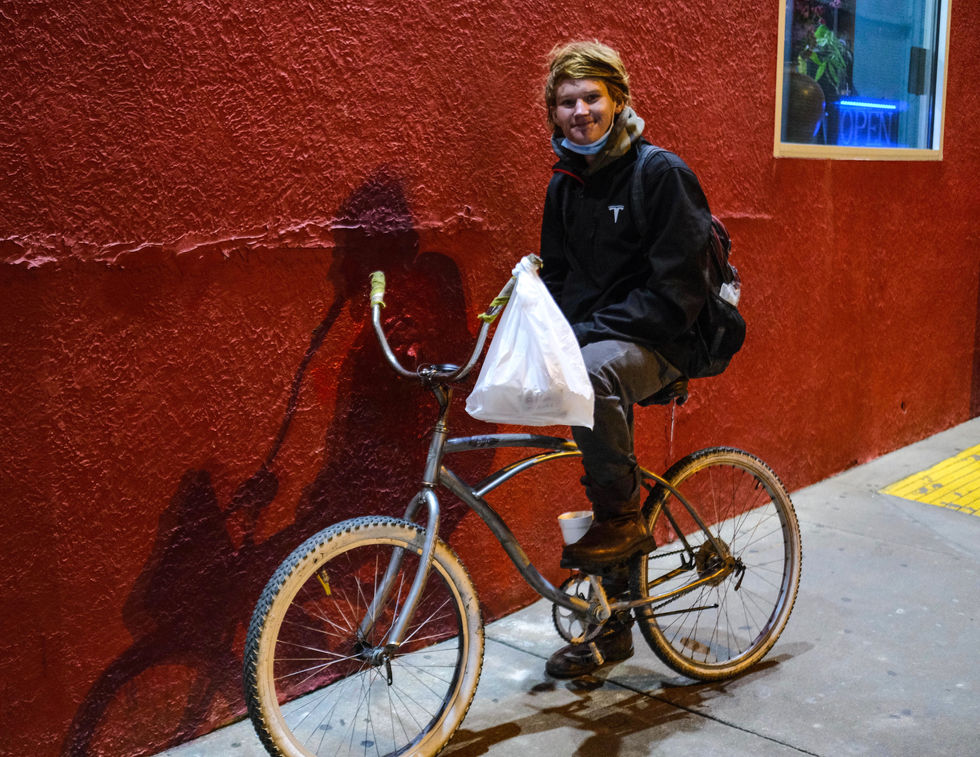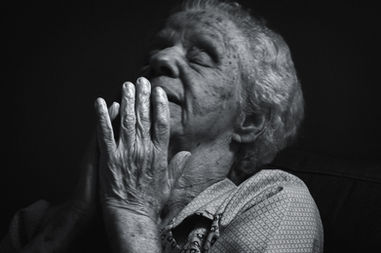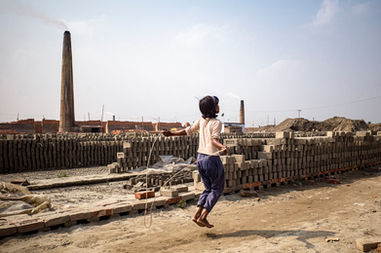
AMY'S ASHES
February 26, 2021
PICTORIAL STORY
Photography and story by Camille J. Wheeler
Introduction by Karin Svadlenak Gomez
Camille J. Wheeler lives and works as a photojournalist in Austin, Texas. Her principal concern is the documentation of social issues, and she often photographs and engages with Austin's homeless community. Camille shared with us the impactful story of one Austin resident: Brian (Scotty) and his mother Amy. A story that deserves to be told in her own words.
-min.jpg)
In the winter of 2020, as Austin braced for the coronavirus outbreak, I met a woman named Amy, a member of the city’s downtown homeless community who spent her nights roaming Sixth Street.
Uncharacteristically for me, a street photographer possessed of an insatiable curiosity and a love of people, I never interviewed Amy. I never engaged her in conversation. And in a decision that will haunt me forever, I never took her picture. Amy wore a heaviness like a cloak. She was small in stature, maybe just shy of 5 feet in height, and she walked with the odd, halting gait of the psychically wounded.
Spring arrived in Austin, bringing with it the Covid-19 pandemic and the subsequent closures of bars on Sixth Street, the wild beating heart of the downtown Austin entertainment district. Face mask on, I became a denizen of the night in my own right, sporadically venturing to Sixth to hear one of my favorite street musicians, acoustic guitarist David Quick, perform outside a closed bar on what was now a virtually deserted thoroughfare.
It was in this empty space that I began to take closer notice of Amy. I often saw her from a distance, walking alone. I respected Amy’s privacy. Sensing her depths of raw pain, and seeing her tired, forced smile, I decided not to pry into her personal life. A few times, Amy and I briefly stood together on Sixth, listening to David play. Our greetings were simple. A friendly nod, a quick hello before Amy ambled off, to locations unknown.
What I didn’t know about Amy was substantial. I didn’t know that she grew up in Danville, Illinois, where she was a model student in school. I didn’t know that she was a mother of three children, including her eldest son, Brian, who was born in Danville and was living in the homeless community in South Austin, some five miles away.
I didn’t know that Amy had come to the Austin area several years prior, trying to get her life back on track after suffering a series of personal setbacks. I didn’t know that Linda Addis, a close friend of Amy’s since their freshman year at Danville High School, had taken in Amy and her two sons, Brian and Zach, at her home in Bastrop, southeast of Austin.
I didn’t know that Amy lost custody of her sons, sending her family into a destructive tailspin and sending Brian and Zach, 15 years apart in age, into the Texas foster care system. And I didn’t know that for Amy, the loss of her sons was a pain too great to bear.
And neither I, nor anyone else, knew that on August 27, 2020, at approximately 12:30 a.m. in downtown Austin, a wayward bullet fired from a stranger’s gun would claim the life of Amy Lynn Warner, a mother, a daughter, and a friend to many, at the age of 51.
There was no obituary for Amy, just short news articles summarizing what happened. In late August, Hurricane Laura evacuees from Southeast Texas were sheltering in Austin. On August 27, two evacuee groups began brawling near the intersection of Sixth and Brazos streets. Shots were fired, and Amy was accidentally killed. I gleaned more details from my friends on the street. Amy was standing on the Brazos Street sidewalk, right in front of a newly installed City of Austin water drinking station, when a fight erupted over an electric scooter. A man inside a car pulled out a gun. Four shots rang out, and one bullet tore through the stainless steel of the water station, ripping into Amy’s neck. She was rushed by ambulance to a hospital and died later that morning.
Tragically, it was in Amy’s death that I began finding out about her life. From my friend Catherine “Cat” Fako, who knew Amy as a fellow street resident, I learned about Amy’s son Brian. In a strange twist of fate, he had lived with his mom in downtown Austin before moving to the city’s south side. Cat said she was worried about Brian, a sweet kid living on his own.
Devastated that I had never gotten to know Amy, I resolved to find Brian. I didn’t know what kind of help I could offer him. But I wanted to try. So it was that I embarked on a mission of locating Brian, a journey that would take a heartbreaking turn of helping him find his mother’s ashes.
In the ensuing months, I cautiously started looking for Brian in the homeless encampments in South Austin, respecting both the Coronavirus and the privacy of individuals whom I did not know. Eventually, I met a man named Hex, who lived in a tent beneath U.S. 290. Hex knew Brian — Scotty, as he was known — and graciously volunteered to help me find him. There are dozens of encampments and countless tents in this South Austin area. Even with Hex’s help, I kept failing. I couldn’t find Brian.
On Thanksgiving Day in November, I was visiting with a homeless man at a gas station near the expanse of concrete where Hex lived. Hex saw me and walked over. He said he had just seen Scotty and would go get him. About 20 minutes later, Hex approached with Scotty, a sorrowful figure dressed entirely in black. Tears flooded my eyes. Scotty, a beautiful young man with red hair, a slender build, and twinkling blue-green eyes, was the spitting image of his mother.
Hex left Scotty and me alone to talk. Scotty started crying. He said he had heard from several people that I was looking for him. He was overwhelmed that I cared. “I’m just happy that someone came around to talk to me,” he said, choking back tears. “Thank you.”
His story, and his grief, came tumbling out. Brian Scott Smith, who prefers to be called Scotty, hadn’t seen his mother in about two years before her death. He learned of her passing from Linda, his mom’s longtime friend, who drove to South Austin from Bastrop and somehow found Scotty in the camp where he was staying.
Scotty filled in missing details from the past. Amy and Zach, his little brother, moved from Danville to Bastrop, Texas, to live with Linda, a woman so close to Scotty’s family that he calls her his aunt. Eventually, Scotty joined his mom and brother in Bastrop. Amy lost her job, and, because of serious legal problems, lost her sons to foster care.
Amy became homeless and joined the community beneath Interstate 35 in downtown Austin. Scotty and Zach were sent to a group home, where they were separated from each other. From the ages of 16 to 18, Scotty was shuffled between foster care homes in Texas. Desperately unhappy, he ran away more than once, and he wound up homeless as a teenager in downtown Austin. One day, shocked, he saw his mother under I-35. “Wow, Mom,” he asked, “how are you here?”
Amy and Scotty stayed together for a while at a small camp, but Scotty was frightened by the violent crime in the area. Plus, tensions were high between him and his mom. They got into a heated argument, and he left, migrating to South Austin where he felt safer. Scotty was adrift, without a nuclear family. His father, Donald Smith of Ashmore, Illinois, died of cancer on July 27, 2020, one month before his mother was killed. His younger brother, who was about a year old when he and Scotty were separated, was sent to an undisclosed foster care location.
As for his mother, Scotty had harbored a dream that they would someday live together under better circumstances. “All I was really hoping to do was get housed and then take my mom in,” he said. “Now I can’t do that.”
What he needed the most, Scotty told me, was to learn where his mom’s body had been taken. “If she’s not at the coroner’s office, of all places, then where the hell is she?” he asked. “All I want is my mom’s ashes and to know where she is, if she got buried and I can go visit her grave.” He looked at me, tears shining in his eyes. “I’m sure my mom can see me right now. I miss her a lot.”
I told Scotty I’d help with the search. I called the Travis County Medical Examiner’s Office but was denied information available only to family members. I next reached out to Linda Addis and her husband, Josh, the Bastrop couple who have done so much to help Scotty and his family. During a phone call in December, they told me that Amy’s body had been sent to Illinois, where Scotty’s half-sister has their mother’s ashes. I met again with Scotty six days before Christmas. Now living in a tent under U.S. 290, he thanked me for the information about his mom. He was grateful she went home to Illinois. “At least I know where she’s at,” he said. “She didn’t just disappear.”

In March, Scotty will celebrate his 24th birthday without his mother or his brother, who is turning 9 in February. Scotty still doesn’t know where Zach is living. “I want him to know that he does have a brother out there, you know?” Scotty said, his voice cracking with emotion. “That he wasn’t just alone.”
And Scotty wants me to tell his mother’s story — that she struggled with significant mental and physical health challenges. He wants people to understand “that my mom wasn’t just some other homeless person. That she had a family; she had people who cared.”
Editor's Note: It's with deep sadness we write that Scotty passed away on August 5, 2021. He was only 24.

The views, thoughts, and opinions expressed in the text belong solely to the author/s, and are not necessarily shared by The Pictorial List and the team.

































